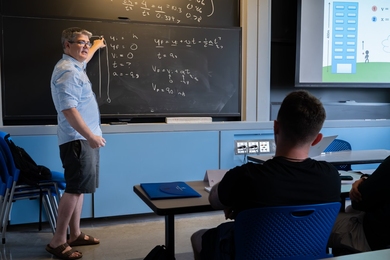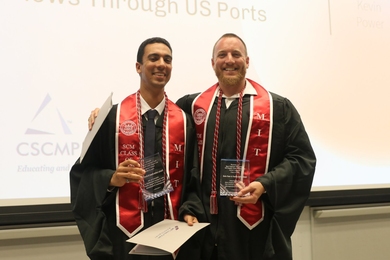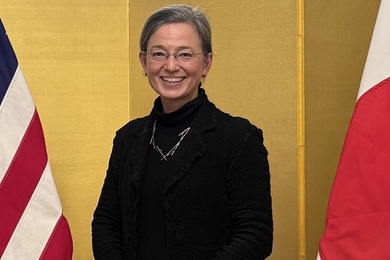CAMBRIDGE, Mass. -- There's a profit-making institute within the Institute that has its own array of course offerings, about 75,000 alumni/ae, and a 50-year history of what some consider to be the best connections with industry anywhere at the Massachusetts Institute of Technology.
The Professional Institute, better known as the Summer Session for more than four decades, is going into its 50th year of short summer courses for industry.
"This [the Professional Institute] is the primary vehicle for volume industry exposure to MIT," said Professor Edward B. Roberts of the Sloan School, who has taught in the summer program since 1962.
"We know we've had impact because we've changed industry's vocabulary," Roberts said. "Before we were even teaching technology management in Sloan courses, MIT was turning up as number one in technical management in surveys. Why? Because senior management learned it in the summer course. For good or for bad, we've affected lots of people's thoughts about how to manage technology."
President James R. Killian Jr. established the initiative in 1949 "to help faculty into greater direct contact with senior leaders and decision-makers in industry and government," said MIT President Charles M. Vest
"There can be little doubt of the enduring value this program has had for both the Institute and for the larger community we serve. One of the very first initiatives of its kind in the United States, it has often been imitated, but never excelled," Dr. Vest said.
Frederick J. McGarry, a professor in the Department of Materials Science and Engineering who has directed the program since 1983, said the Summer Session was set up by its first director, Professor Emeritus of Meterology James Austin, "in a very clever way. People who teach get supplemental income, as do the Institute and the departments. Everybody benefits."
McGarry said the program has turned a good profit from the start. About 1,500 people attend the 50 to 60 course offerings each summer.
PLOT YOUR COURSE
While the course content has changed dramatically in 50 years (reflecting current research), and the student body has diversified (it was mostly men for many years), students still spend from two days to two weeks surrounded by their peers in an intensive professional course.
They pay about $2,000 to attend most of the courses, which are designed and taught by individual faculty members who quickly develop a following of professionals in their field. Topics range from applied biology to leadership to engineering systems.
The mid-career professionals who attend come from all 50 US states and many foreign countries. Most have graduate degrees along with their industry experience, according to McGarry, who first taught his course on composite materials in 1962.
"It's a bona fide intellectual exercise, because two-thirds of the students have advanced degrees; one-third have PhDs. They're not just Joe Six-Pack by any means," McGarry said. "Teachers of the summer courses make a lot of contacts for consulting, research and other activities within industry and government.
"At MIT, the faculty member doesn't have to look for things to do. But teaching these courses provides some real intellectual and professional rewards aside from the monetary," he said.
VETERAN PERFORMER
Professor Roberts, whose course on Management of Research, Development and Technology-Based Innovations has been the longest-running and biggest revenue earner of all the summer sessions, agrees with McGarry. Every summer, as many as 60 senior managers pay $11,000 each to attend the 10-day course featuring 15 MIT faculty members and researchers, including Roberts, who has not missed a course in 36 years.
"Early on, it was kind of expected that you set up a summer course. It was your way of saying to the world of industry: 'Here's what we're doing. Come and look at it and respond,'" said Roberts.
"My faculty get their ideas tested in a classroom of senior industry people. And sometimes, the first exposure of the research to these senior managers doesn't go over very well. They may say 'Baloney. This won't fly,'" said Roberts, the David Sarnoff Professor of the Management of Technology, chairman of the MIT Entrepreneurship Center and co-chairman of the MIT International Center for Research on the Management of Technology.
The motto of this 50-year-old program, "Helping Experts Stay That Way," remains as valid today as when it began, said McGarry. "There are no signs that the need is lessening or that competitive programs, of which there are many, are displacing it," he said. Most of those competitors are shorter -- often weekend seminars -- and don't offer the same intensity or faculty contact as the MIT summer courses.
"The drinking-from-a-fire-hose analogy so cherished by our undergrads really applies to this program. A tremendous amount of material is thrown at these people during their time here, much of it on paper or disk that they carry away with them. Then they have the rest of the year to study and learn it," McGarry said.





